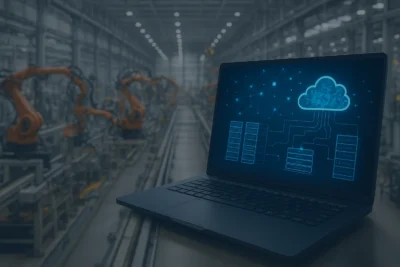Manufacturing system integration is the backbone of modern production processes. Without a well-connected ecosystem, manufacturers struggle with inefficiencies, downtime, and data silos that hinder decision-making.
As manufacturing operations become more complex—with robotics, the Internet of Things (IoT), and real-time data playing a larger role—seamless integration solutions are critical for maintaining competitiveness.
This article explores the five essential elements of successful manufacturing system integration.
Key Takeaways
- A clear integration strategy helps manufacturers stay efficient, avoid unnecessary costs, and align technology with business goals.
- Seamless connectivity ensures different systems work together smoothly, preventing data silos that slow decision-making and operations.
- Real-time data helps manufacturers detect problems early, improve efficiency, and reduce delays in production processes.
- Scalable and secure systems support business growth while protecting sensitive data and ensuring compliance with regulations.
1. A Clear Integration Strategy Aligned with Business Goals
A successful integration project starts with a well-defined strategy that aligns with business objectives. Without a strategic approach, manufacturers risk inefficiencies, redundant efforts, and costly reconfigurations.
IT service providers specializing in managed services play a crucial role in this process.
They help manufacturers assess existing systems, map workflows, and implement platforms like 3DEXPERIENCE, ensuring that integration efforts are tailored to specific needs.
2. Seamless Connectivity Across Systems & Devices
Modern manufacturing environments depend on seamless connectivity to keep operations running efficiently. Enterprise resource planning (ERP), manufacturing execution systems (MES), and shop floor control systems must communicate effortlessly to support real-time data exchange.
Without this connectivity, manufacturers risk product data silos that slow decision-making and reduce operational efficiency.
Managed IT service providers can help ensure that legacy systems, automation tools, and new software solutions communicate effectively by handling the complexities of application programming interfaces (APIs) and middleware.
With expert data management, manufacturers can prevent bottlenecks, maintain system compatibility, and make faster, data-driven decisions.
3. Real-Time Data for Proactive Decision-Making
Real-time data is transforming manufacturing by enabling proactive decision-making, minimizing downtime, and optimizing workflows.
IT service providers can implement AI-driven real-time data analytics within manufacturing systems, ensuring seamless integration across ERP, MES, and control systems, allowing businesses to collect, analyze, and distribute real-time insights organization-wide.
With this level of connectivity, manufacturers can detect inefficiencies early, optimize inventory management, improve quality control, and prevent costly disruptions—keeping production on track in an increasingly competitive industry.
4. Scalability & Flexibility to Adapt to Growth
A successful software integration process must support future expansion, allowing manufacturers to scale their operations as demand increases and technology evolves.
For manufacturing companies, scalability means ensuring that new production lines, suppliers, and business processes can be integrated without major disruptions.
Managed IT service providers play a role in this process by designing and implementing integration solutions that accommodate emerging technologies like IoT, robotics, and AI-driven automation.
With a flexible and well-integrated system, manufacturers can embrace innovation while maintaining operational efficiency and avoiding costly reconfigurations.
5. Robust Security & Compliance Measures
Information security is a critical component of manufacturing system integration, especially as businesses adopt cloud-based solutions and AI-driven automation.
IT companies specializing in managed services can secure manufacturing environments. By implementing encryption, access controls, and multi-factor authentication, they help businesses safeguard real-time data across ERP, MES, and control systems.
Additionally, compliance with industry regulations such as ISO 27001 and NIST cybersecurity frameworks is essential to maintaining data integrity and avoiding costly breaches.
A secure integration approach minimizes risks and strengthens trust with customers and partners—an increasingly important factor as digital transformation accelerates across the manufacturing industry.
How Can Keystone Technology Consultants Help?
At Keystone Technology Consultants, we specialize in crafting integration solutions tailored to your manufacturing operations. Our expertise in ERP, MES, and automation ensures that your systems communicate seamlessly, providing real-time data for better decision-making and improved workflow optimization.
Whether you’re looking to streamline supply chain management, enhance quality control, or minimize downtime, our team is ready to help.
Contact us today to discuss how we can enhance your manufacturing systems integration for maximum efficiency and scalability.




